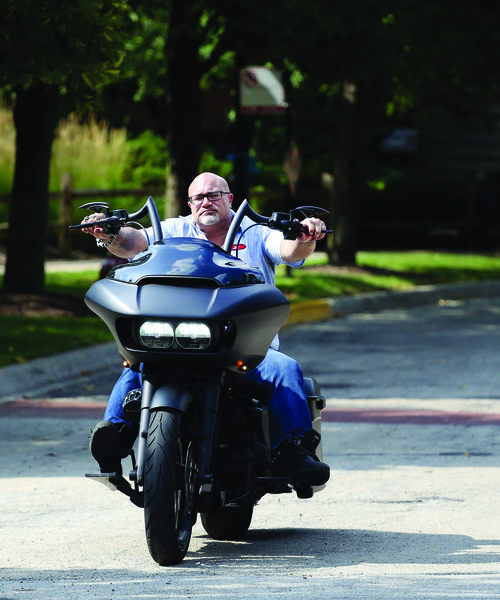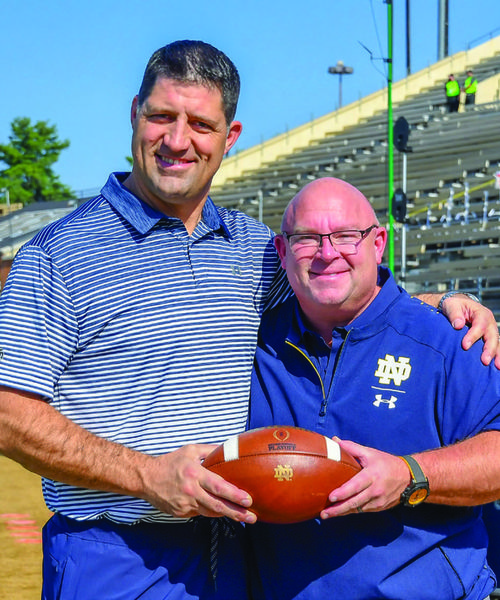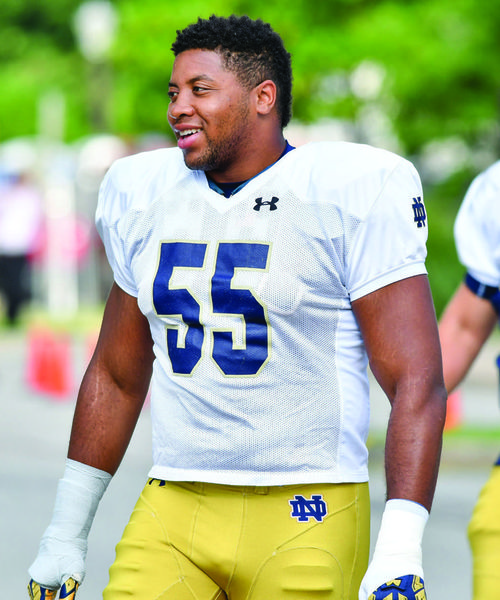
Chris Zorich
Just the Latest Challenge
Chris Zorich views his new job as a metaphor for his life.
In May 2018 he became athletics director at Chicago State University, a veritable punching bag of an institution so battered by years of mismanagement, graft and political squabbles that its very survival has recently seemed threatened. New leadership in the person of President Zaldwaynaka “Z” Scott vows that things can and will be different on the school’s pretty but long-neglected southside campus. Zorich, a much- decorated football All-American at the University of Notre Dame from 1988-90, is part of the turnaround team, hired to build a credible athletic program.
“Athletics is the front porch of the university,” he says. “If athletics does well, it reflects well on the entire school.”
Zorich might as well be starting from scratch. Chicago State’s struggles to field and fund competitive teams might be funny if they weren’t so dispiriting to student-athletes grown weary of seeing their best efforts thwarted by almost non-existent support.
“This is an underdog school, but there’s a lot to work with,” Zorich insists. “I wouldn’t be here if I didn’t believe I could do the job. I’ve had a lot of obstacles to overcome in my life, but I always felt I had the tools.”
Of the thousands of stories, fables and legends that comprise Notre Dame football lore, Zorich’s is among the best-known — and most inspiring.
Abandoned by his father and raised by an impoverished single mother on the meanest streets of Chicago’s southeast side. Occasional dumpster dives at a neighborhood grocery store for discarded food too old to sell, but not to eat . . . maybe. Steered toward football by a high school coach who became both a father figure and a fierce advocate. A storybook Notre Dame career that included a national championship, a school-record 23-game winning streak, a 33-4 record over three varsity seasons and a national defensive player-of-the-year award as a senior in 1990.
But it was not without heartache. After the final game of his college career — a soul-crushing 10-9 loss to Colorado in the 1991 Orange Bowl — Zorich returned home to find his beloved mother lying on the floor of her modest apartment. Zora Zorich’s death from a heart attack at 59 left her 21-year- old son feeling shattered, helpless.
“She was my rock,” Zorich says quietly.
In time his trademark resilience kicked in, and he regrouped. A second-round draft pick of the Chicago Bears, Zorich would play more than five seasons with his hometown team and a partial sixth with the Washington Redskins. It’s a fact of Chicago life that all Bears players enjoy exalted status within the city’s football- crazy culture, and Zorich enhanced his standing with extensive charity work that marked him as a man of substance who’d never forget his hardscrabble roots.
Then, another setback. The Christopher Zorich Foundation, known for distributing holiday turkeys and food baskets and other acts of kindness toward the city’s needy, was accused of financial mismanagement when state investigators couldn’t account for $300,000 in foundation funds. Worse, Zorich was found to have paid no federal taxes over a four-year period.
There was an explanation: Zorich had hired a cousin as his personal assistant and entrusted her with everything: oversight of the foundation, answering his mail, managing his finances. While he was off working in the Notre Dame athletic department, his cousin was battling cancer, a fight she eventually would lose.
“I didn’t want to remove her because it would have looked like I was giving up on her when she got sick, and I didn’t want her to feel that way,” Zorich says.
So the foundation and his personal finances went largely unattended, and the consequences were severe. Zorich had to repay the missing money to the state, which he did, over time. He settled with the government in the tax case and escaped jail time in favor of probation, which was lifted after the one year it took him to complete 200 hours of community service.
Embarrassment was the worst sentence of all. “I felt like I’d let my mother down,” Zorich says.
He resigned from Notre Dame and, by his own admission, went underground for a while.
“A lot of people who always wanted to shake my hand, pat me on the back . . . none of those people were there for me. I found out who my friends are,” Zorich says.
“It was a terrible situation, no question. It changed me, but I look back on it as a great learning experience. Responsibility, for one thing. Accountability. If your name’s on the door, you’re it.”
One friend who stood by him was Tim Ryan, his former Irish teammate and Sorin Hall roommate.
“There were some down times, for sure, when we were hanging out in his garage not knowing what to expect,” Ryan says. “But Chris never gave up on himself or on this vision he had to become an athletic director. You have to admire his tenacity. But if you ever saw him play. . . .”
In time Zorich came to realize it was pointless to dwell on what he might have done differently.
“Nobody stole any money,” he says. “And it’s unfortunate that besides the food giveaways, a lot of good work that the foundation did was forgotten. A clothing store chain I’d done an ad for went out of business and gave us their inventory — three floors of a warehouse. We were able to provide a lot of people with some really nice new clothing.
“A guy called me up afterwards and said, ‘Chris, I haven’t been to church in 15 years. But I can go now because I have proper clothes.’”
Zorich dissolved the foundation, but a desire to help others remained his driving force as he put his life back together. He re-entered the workforce as athletic director at St. Sabina Academy, a grammar school that’s part of the vibrant faith community Rev. Michael Pfleger oversees on Chicago’s south side, four miles from Zorich’s boyhood home. A Chicago Park District position offered better pay and benefits, but as a facilities manager, Zorich wasn’t getting the personal interaction with young people he sought.
He found it in the athletic director’s position at Prairie State College, a two-year school in Chicago’s gritty south suburbs with resource limitations not unlike Chicago State’s: Zorich drove team buses, lined playing fields and even coached soccer for part of a season after a coach’s abrupt resignation.
Thus Chicago State, with all its problems, will not be a shock to his system.
“These kids haven’t been through anything I haven’t experienced,” Zorich says.
Good and bad.
“More than ever I believe in second chances,” he says. “If there’s an issue with a student-athlete, I won’t automatically kick them off the team, count them out. My first response will be, ‘Why did this happen?’ and go from there. We have to change to an ‘expect success’ culture. It hasn’t been here for a while.”
Zorich has the Chicago State administration’s backing as he seeks to instill that culture.
“Chris Zorich’s name still resonates in Chicago, and he can do good things for Chicago State,” says Michael Holmes, a former University of Illinois football star and longtime Chicago high school coach who is a special assistant to President Scott. “We’re going to do everything we can to help him be successful.”
Zorich views an athletic director’s job as one of service to the 200 student- athletes and 30 staffers for whom he is responsible.
“I met with our student-athletes for three hours the day after I was hired. They seemed beaten down by the way things had been around here, and what I heard from them helped shape my vision of what needs to be done.”
It starts with small things. If you run into Zorich on campus, expect to be offered a Cougar-logo lapel pin in Chicago State’s forest-green colors.
“Identity,” he says. “I had 300 made and I had to order more a week later. The kids should be proud of being at Chicago State. All of us should.”
Zorich declined the spacious, airy third- floor office his predecessors had occupied in favor of a closet-like first-floor space that’s more in the middle of things at athletic department headquarters in the Jones Convocation Center.
“I want to be with my team, and I want the kids to know they have access to me,” he says. “I have an open-door policy with our kids. They can come in and talk to me about anything.”
The third-floor office is being converted into a “fueling station” offering protein shakes and smoothies and healthy snacks to student-athletes, prepared by a sports- nutritionist Zorich hired with funding from a grant he obtained. A sports nutritionist is a first for Chicago State, and it’s in keeping with Zorich’s desire to maximize the student-athlete experience.
“We want to win games, obviously, and if we don’t win enough we’ll get fired. But I want coaches who are teachers, educators, not just coaches. Because our main charge is to help our student- athletes become better people, better citizens. We want our kids to know we care about them.
“I’ve been there. Athletics saved my life.”
At 6-foot-1 and a few biscuits shy of his 280-pound playing weight, Zorich remains a room-filling physical presence. He still moves with the easy grace of an athlete and looks quite capable of stuffing a USC run or blowing up a Miami double-team block, though the flecks of gray in his goatee betray his 49 years.
Photos of Zorich with President Bill Clinton and Colin Powell and an iconic shot of his mother signing an autograph outside Notre Dame Stadium share wall space with his undergrad and law school diplomas from Notre Dame in an office he has been too busy to unpack.
“I’m bringing the ND family with me,” he suggests somewhat sheepishly. But why not?
Openings for men’s and women’s basketball coaches greeted Zorich when he took the job, and Muffet McGraw and Mike Brey were generous with advice.
“I am not a basketball guy, so I said, ‘What am I looking for?’” Zorich recalls. “They could not have been more helpful. Coach McGraw, the woman who took down Geno Auriemma and UConn, is a phone call away. How cool is that?”
From Brey he got more than insight. The Irish had an opening on their schedule after another team begged off over a conflict, so Chicago State faced Brey’s Irish at Purcell Pavilion on Nov. 8 . . . for a budget-enhancing guarantee.
At an athletic directors’ convention, Zorich sought out Ken Kavanagh — a Notre Dame grad and the athletic director at Florida Gulf Coast — who sold him on the importance of social media.
“Twitter, Facebook — I avoided all that because I didn’t want people in my business,” Zorich says. “Ken couldn’t believe that. He said, ‘Chris, you have to be on Twitter.’ Now I’m on it all the time, tweeting out good stuff about our athletes.”
If John Potocki, his coach at Chicago Vocational High School, is responsible for Chris Zorich the football player, former Notre Dame athletic director Kevin White is the man who steered him toward athletic administration, hiring him as manager for student welfare and development at Notre Dame in 2008.
“Kevin White saw something in me that I might not have seen in myself,” Zorich says.
He didn’t have to look hard.
“Chris personifies inordinate passion and intensity in everything he engages,” says White, who left Notre Dame for Duke and still serves as the Blue Devils’ athletic director.
“He has a deep devotion to the plight of today’s student-athlete and the crazy expectations that accompany being one — everyone is supposed to win a national championship while earning a 4.0 GPA.
“To me, this is a Cinderella moment for Chris, up there with signing with the Bears,” White adds. “To become a Division I athletic director in the hometown he loves is amazing icing on a very rich cake.”
Ryan concurs. “He’s in a good place.”
Along with Ryan, Zorich keeps in close touch with former Irish teammates Tony Rice and Pat Terrell, bonding over (of all things) motorcycles. A Chicago Tribune article referred to them as “the Ridin’ Irish,” and the Notre Dame campus is a frequent destination on football weekends. An ESPN crew accompanied them to the Pittsburgh game in October for a future GameDay feature.
“I keep reverting back to Notre Dame, but Notre Dame was the defining point in my life,” Zorich says.
“None of the things I’ve experienced would have happened for me if it wasn’t for Notre Dame.”

